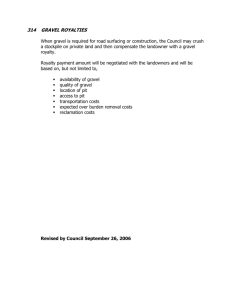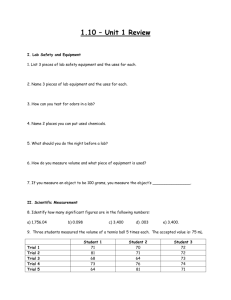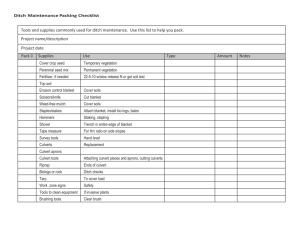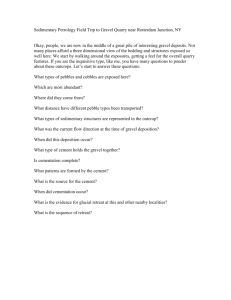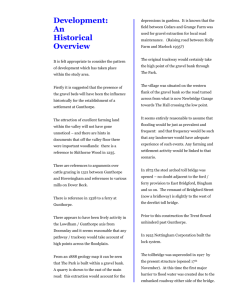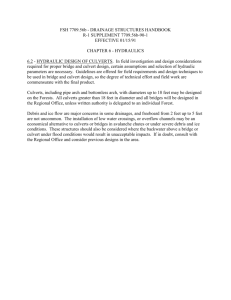Managing Road Maintenance Efficiently and Economically
advertisement
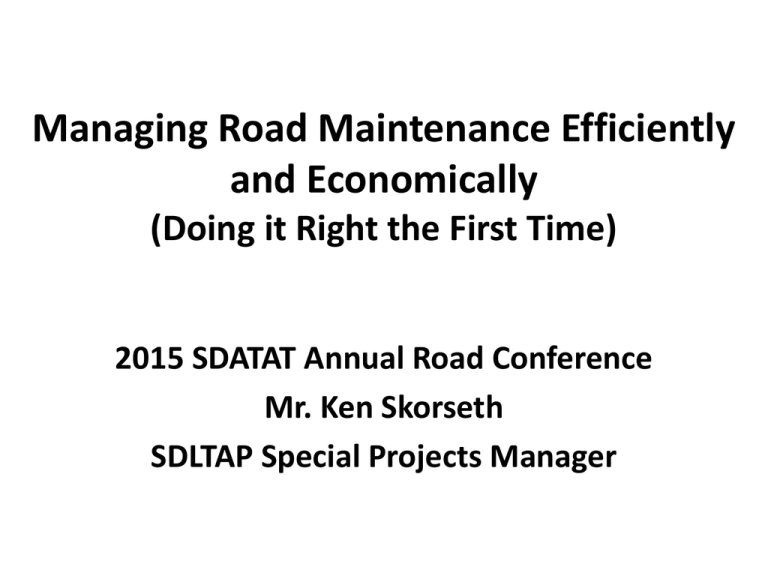
Managing Road Maintenance Efficiently and Economically (Doing it Right the First Time) 2015 SDATAT Annual Road Conference Mr. Ken Skorseth SDLTAP Special Projects Manager Managing Maintenance on the Road System • • • • Know your road system Know your budget Assess maintenance needs Develop a basic maintenance plan to fit the budget • Set priorities • Know your road system – Sounds simple? – Too many supervisors can’t quickly define how many miles are on the twp system. • Know your road classes: – Full maintenance – Minimum maintenance – No maintenance – Closed, but remains a public R-O-W Several ways to keep track of system Simple map from a free atlas – This is OK! Roads marked are vacated or closed: Minimum/no maintenance roads added: Complete system with full maintenance added: Excellent electronic maps available today: Source: SDDOT Web Map Link • Know your budget – Can’t be determined to the penny each year, but make the best estimate possible • Calculate how much planned maintenance the budget will support: – Blade maintenance – New gravel – Culvert replacement – Signs – Snow plowing, emergency reserve, other? • Assess maintenance needs 21 miles full maint. 5 miles minimum maint. • Develop a basic maintenance plan to fit the budget 1. Blade maintenance – $40 to $50 per mile per cycle. (Six to eight cycles per year?) 2. New gravel: ______ tons at unit cost of $8 to $15 per ton hauled and spread on the road. 3. Replace ______ culverts each year. (Cost varies greatly related to length and diameter of pipe) 4. Repair/replace _______ traffic signs each year. ($95 ea. – recent estimate for 30 in. reflective sign and 10 ft. square tube post) 5. Ditch cleaning, pipe cleaning, mowing, snow plowing, etc.? • Set Priorities – There will never be enough funding to cover every need. – Figure out which routes have the most critical need related to: • Traffic volume • Level of service, i.e., serves residents, mail routes, school routes, commercial access or? • Proposed new development – A feedlot? Dairy? Large grain storage facility? Other? • Estimate total costs: – Example cost calculation for blade maintenance: 1) Assuming the average cost of blading is $45 per mile per cycle and 2) Eight cycles of maintenance is needed in an average year to keep a low volume in acceptable condition, 3) Total cost is $ 360 per mile annually. • Example cost calculation for gravel: 1) It takes 1,026 tons of gravel to replace a two inch compacted layer 18 ft. wide on one mile of gravel road, so 2) At a unit cost of $10 per ton placed on the road, the cost per mile is $10,260 per mile. • Example cost calculation for replacing culverts: 1) Remove and replace a 24 inch culvert $1,700 2) Remove and replace a 48 inch culvert $5,000 Source: Cost estimates obtained and used before legislative committees last year. How far will the budget stretch? • Assumption: 21 miles of full maintenance roads: 1. Eight cycles of blade maint @$45 x 21: 2. Replace four 24 inch culverts @$1700: 3. Replace 10 traffic signs: 4. Replace two inches of gravel layer on three miles @$10,026: 5. Other – ditch cleaning, snow plowing: Total $ 7,560.00 $ 6,800.00 $ 950.00 $30,078.00 $ 2,500.00 $47,888.00 But annual budget is only ±$28,000! Some Advice on Doing Things Right Require good shaping techniques from your blading contractors. Excellent drainage of water from the road surface to the ditch This contractor is charging the same rates! Inferior work? Define clearly what you expect: Example Illustration of Roadway Cross Section Make sure culvert installation is done right: Good work to clean a ditch and install new culvert under a gravel road Note culvert is placed perfectly on the flow line of the ditch Inspect culverts and do the maintenance This road could fail if trash is not cleared from culvert before the next heavy rain The need for gravel – how many of your roads look like this after rain? Purchase the best gravel you can find Great contrast in surface condition due to quality of surface gravel Good gravel stays in place, lasts longer, and is the cheapest material in the long run SDDOT Standard Gradation and Plasticity Requirements for Aggregate Base Course and Gravel Surfacing – Don’t be afraid to ask for material that meets a state specification. An added challenge: try to stay on top of pending agribusiness development Served by the same road: Existing road condition Same access, different location The county road didn’t hold up too well either Summary of Good Management • • • • • • Really know your road system Know your annual budget as close as possible Have a maintenance management plan Prioritize! Demand quality work and materials Try to anticipate future development. THANK YOU
